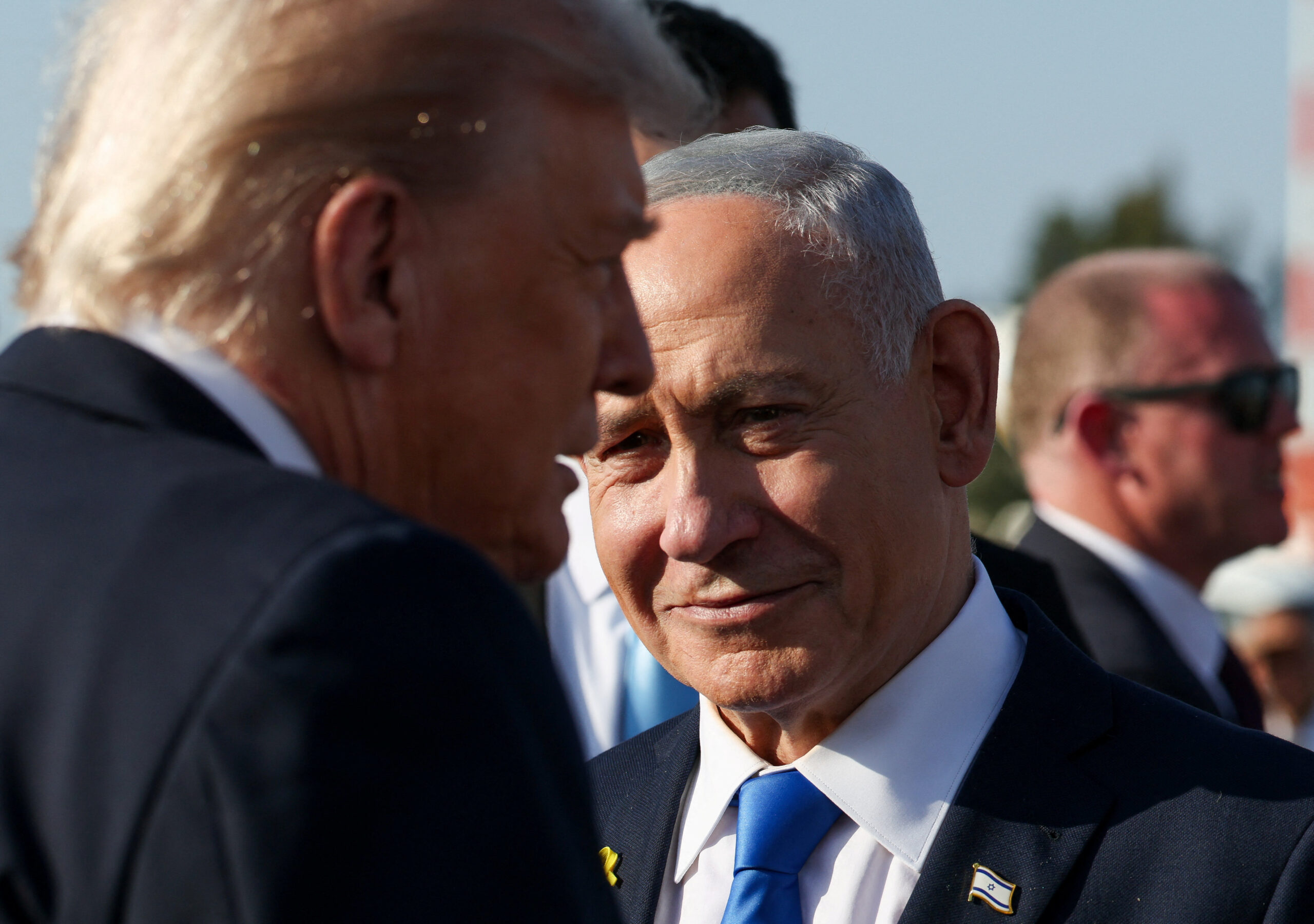WASHINGTON—When Donald Trump visited Israel on the day that the twenty living Israeli hostages held by Hamas in Gaza returned home, the US president offered a warm embrace of Israeli Prime Minister Benjamin Netanyahu. The two greeted each other as old friends at the foot of Air Force One and shared a limo ride to Jerusalem. In his speech to the Knesset, Trump praised Netanyahu as “a man of exceptional courage and patriotism, whose partnership did so much to make this momentous day possible.”
These images, together with the abundant joy Israelis of all stripes expressed at the return of the hostages, could provide Netanyahu with a critical boost as Israel heads into an election year in 2026. But it might not work out that way.
The election, which must take place by October of next year but is widely expected to occur earlier amid coalition tensions and budget fights, will determine Netanyahu’s political fate. But it may also chart the course of Trump’s peace plan for Gaza and Israel’s place in the region.
Three possible election outcomes
Netanyahu goes into the election with considerable assets. Israel’s strikes against Iran’s nuclear program, supplemented by US action, were overwhelmingly popular among Israelis. In the past two years, Israeli forces have decimated Hezbollah’s leadership and destroyed many of the group’s strategic weapons, rolling back a major threat to Israel. Then, late last year, the Assad regime, despised for its alliance with Iran and Lebanese Hezbollah, fell in Syria. Even what might at first look like negatives—the opprobrium directed at Israel by European nations and the United Nations, recent recognitions of a Palestinian state, and accusations against Israel in international tribunals—can serve as useful foils for Netanyahu, a politician adept at exploiting the unpopularity of his political adversaries.
But the prime minister also has significant liabilities. Many Israelis hold him responsible for the policy, intelligence, and operational failures before and during Hamas’s devastating October 7, 2023, terrorist attacks. He is accused of having dragged his feet on negotiating the release of hostages. Resentment is widespread over his attempt to divert accountability for what happened on October 7 to security professionals, many of whom have largely accepted responsibility and left their positions. Moreover, Netanyahu opposes the creation of a State Commission of Inquiry that would independently determine responsibility, despite broad public support for such a commission.
Meanwhile, his corruption trial, now in its sixth year, drags on. A bitter debate over the conscription of ultra-Orthodox men—an important element of Netanyahu’s political coalition that resists military service—rankles Israelis who have borne the brunt of the Gaza war with repeated reserve deployments. And even the cease-fire and return of hostages is tarnished by the reality that, thus far, Hamas is hanging on to power and its weapons in Gaza—an unacceptable endpoint for many Israelis, particularly in Netanyahu’s own right-wing base.
Opinion polls consistently show that Netanyahu’s current coalition would fall well short of the sixty-one-seat majority in the Knesset necessary to form a government. But with only fifty-one seats—a more plausible mark—it may be able to block any alternative coalition from forming because Arab parties are unlikely to take part in a successor government.
In this scenario, there are three possibilities: Israel goes to repeat elections, with Netanyahu remaining as interim prime minister; opposition parties form a one-day government before calling new elections, allowing another figure to serve as interim prime minister; or one or more parties break from the anti-Netanyahu bloc to join him in a “unity” government, arguing that it is the only way to prevent paralysis and keep extremist politicians such as National Security Minister Itamar Ben-Gvir and Finance Minister Bezalel Smotrich away from the cabinet. The last scenario poses great risks to any politician from the current opposition who would facilitate Netanyahu remaining as prime minister, given most of their voters’ unbridled antipathy toward him.

Two points Netanyahu will make to voters
As he tries to remain in office, Netanyahu can be expected to make two main arguments to the public.
First, he will say he is Trump’s best friend, seeking association with the US president’s stratospheric popularity in Israel. If Trump chooses to help Netanyahu—out of partnership, or even if only to keep in place a leader who cannot say no to him, as he did when he called for a pardon for Netanyahu in his Knesset speech—it could work in the prime minister’s favor. The US president might even encourage congressional Republicans to invite Netanyahu to address a joint session of Congress, as the Israeli leader did in 2015. Such a move would accentuate tensions between Israel and Democrats, many of whom would likely not attend the speech. At the same time, this approach is no clear winner for Trump in light of the anti-Israel attitudes rapidly gaining currency in his MAGA base.
Second, the prime minister will ask Israeli voters who they trust to prevent the establishment of a Palestinian state: Netanyahu, a longtime opponent of the concept, or less experienced politicians with a more measured history? This is an old standby for Netanyahu, who has consistently vowed to block Palestinian statehood since 2015. Opposition politicians may feel compelled to match his stance, considering that most Israelis, including those who were historically open to two-state outcomes, cannot contemplate a Palestinian state so soon after October 7.
This discourse in Israeli politics over much of the next year will create problems for the implementation of Trump’s plan for Gaza and his aspirations for expanding regional integration. Arab states insisted that Trump’s Gaza plan include a discussion of a “credible pathway” to a Palestinian state. That vague, aspirational reference helps give them political cover to invest in Gaza reconstruction and contribute forces to an international stabilization force—provided there is a mechanism for Hamas’s disarmament. But that limited cover will be stretched thin if Netanyahu and other Israeli politicians are contradicting its very premise on a daily basis.
One other factor in play: Saudi Arabia
The same considerations hold true for expanding the Abraham Accords or advancing Saudi Arabia’s normalization of diplomatic relations with Israel. Like the United Arab Emirates, Bahrain, and Morocco in 2020, additional candidates to normalize their relations with Israel may not insist on the actual establishment of a Palestinian state as a prerequisite for doing so. But beyond the symbolic inclusion in the Abraham Accords of countries such as Kazakhstan, which has long had normalized relations with Israel, it could be more challenging to proceed with new countries. At present, Israeli politics defines the establishment of a Palestinian state as a nonstarter, depriving leaders of any new countries seeking normalization with Israel of the necessary domestic political leeway that even symbolic progress toward such a state would provide.
If there is a solution to this conundrum, Trump may hold the cards—and the world could get a preview of his hand during his meeting at the White House with Saudi Crown Prince Mohammed bin Salman on November 18. Trump could offer transactional inducements—a security guarantee, civil nuclear cooperation, increased access to advanced artificial intelligence chips—to encourage the Saudi leader to take at least limited steps toward normalization with Israel, such as a meeting with Netanyahu or a declaration of future intent. But Trump may also need to use his leverage over Netanyahu—as he did in convincing the Israeli prime minister to accept less than “total victory” in Gaza—to urge him to sufficiently lower the temperature of his opposition to a Palestinian state so that bin Salman can meet him halfway.
Netanyahu’s preferred path to survive a treacherous election will be to show Israeli voters that he is advancing Israel’s regional integration and staying within Trump’s embrace, without appearing to walk back his opposition to Palestinian statehood. This delicate balance, however, will make meaningful progress on Trump’s regional agenda extremely challenging. Trump may conclude that the best opportunities for major breakthroughs in regional integration will come when a new Israeli government takes office in 2027—not during the election year of 2026.

